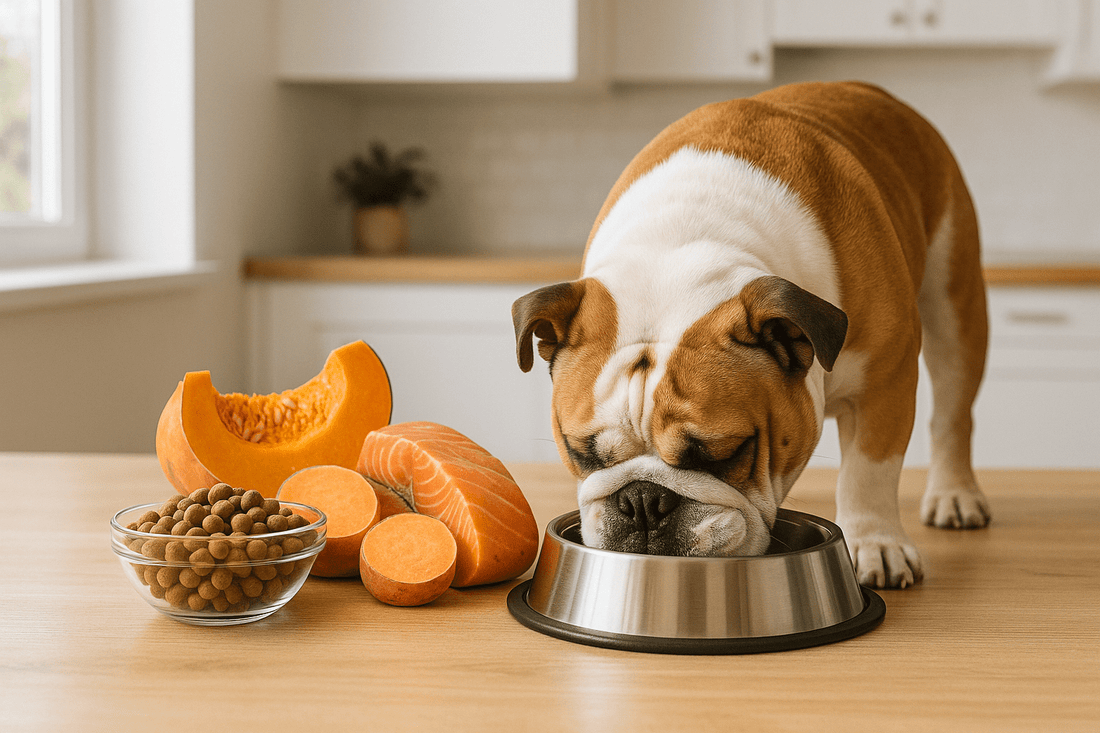
Bulldog Diet & Nutrition: Best Food, Allergies, Schedules & Supplements
Share
Feeding an English Bulldog isn’t just about filling the bowl—it’s about nourishing a breed with unique needs. This guide covers bulldog-safe ingredients, age-based feeding schedules, common food allergies, and science-backed supplements so your companion thrives from puppyhood to senior years.

Bulldog-Safe Ingredients to Build a Balanced Bowl
A complete bulldog diet centers on quality protein, digestible carbs, healthy fats, and targeted micronutrients. Whether you choose premium kibble, gently cooked, or vet-formulated raw, focus on whole, traceable ingredients.
Proteins (Primary Fuel)
- Lean meats: turkey, chicken breast, duck, rabbit.
- Fish: salmon, sardines (added omega-3s for skin and joints).
- Novel proteins: lamb or venison may help sensitive bulldogs.
Carbohydrates (Digestible Energy)
- Sweet potato, pumpkin, oats, brown rice, quinoa.
- Limit refined fillers that can trigger sensitivities.
Fats (Skin, Coat & Brain Health)
- Fish oil, flaxseed, and chicken fat provide essential fatty acids.
- Avoid excessive fat that can upset the stomach.
Micronutrients & Fiber
- Blueberries, spinach, carrots for antioxidants.
- Pumpkin and inulin for gentle digestive support.
Shopping? Look for foods with meat named first, natural preservatives (mixed tocopherols), and clear sourcing. For more care basics, see our Bulldog Care Guide.
Bulldog Feeding Schedule by Age
Feeding frequency and portion control keep bulldogs at a healthy weight—a critical factor for joint and respiratory comfort.
- 8–12 weeks (puppy): 3–4 small meals/day. Focus on puppy-specific formulas rich in DHA.
- 3–6 months: 3 meals/day. Monitor growth; avoid overfeeding to protect joints.
- 6–12 months: Transition to 2 meals/day. Switch to adult formula around 10–12 months.
- Adult (1–7 years): 2 measured meals/day. Maintain a visible waist and easy-to-feel ribs.
- Senior (7+ years): 2 smaller meals/day with joint and heart support as recommended by your vet.
Portion pointers: Start with the brand’s feeding guide based on weight and adjust every 2–3 weeks using body condition scoring. If your bulldog begs often, try puzzle feeders and slow bowls to pace eating.
Common Bulldog Food Allergies & Sensitivities
Bulldogs can be prone to itchy skin, ear issues, or digestive upset. Common triggers include chicken, beef, dairy, wheat, egg, soy, and corn, though every dog is different.
How to Troubleshoot
- Single-protein diets: Choose limited-ingredient foods to pinpoint reactions.
- 8–12 week trials: Eliminate suspected triggers and reintroduce methodically.
- Track symptoms: Use a simple log to note coat, stools, ears, and paws.
If symptoms persist, ask your vet about a supervised elimination diet. For puppies with sensitivities, visit our Bulldog Puppy Care guide.
Smart Supplements & Treats (Without Overdoing It)
Helpful Supplements
- Omega-3s (EPA/DHA): Skin/coat and joint comfort.
- Probiotics: Gut balance, especially after antibiotics or tummy upset.
- Joint support: Glucosamine, chondroitin, and MSM for hips and elbows.
Note: Large calcium doses can harm growing puppies—use puppy-specific diets instead of DIY supplementation unless your vet advises.
Treat Strategy
- Keep treats under 10% of daily calories.
- Choose single-ingredient options: freeze-dried fish, sweet potato chews.
- Use treats for training and mental enrichment, not meal replacements.
Sample One-Day Bulldog Meal Plan
- Breakfast: Measured kibble (meat-first) + spoon of pumpkin.
- Lunch (puppies only): Smaller kibble portion or rehydrated air-dried food.
- Dinner: Kibble with a topper (sardines in water, drained).
- Training treats: Low-calorie, soft, high-value bites.
FAQ: Bulldog Diet & Feeding
What is the best food for an English Bulldog with allergies?
A limited-ingredient diet with a novel protein (e.g., salmon or duck) often helps. Trial for 8–12 weeks and reintroduce proteins slowly.
How often should I feed my bulldog puppy?
3–4 times daily until 3 months, then 3 meals to 6 months, and 2 meals by 10–12 months.
Do bulldogs need supplements?
Not always. Omega-3s, probiotics, and joint support are commonly beneficial—speak with your vet for tailored advice.
How do I keep my bulldog at a healthy weight?
Measure portions, use a slow feeder, and check body condition every few weeks. Adjust calories as activity changes.

